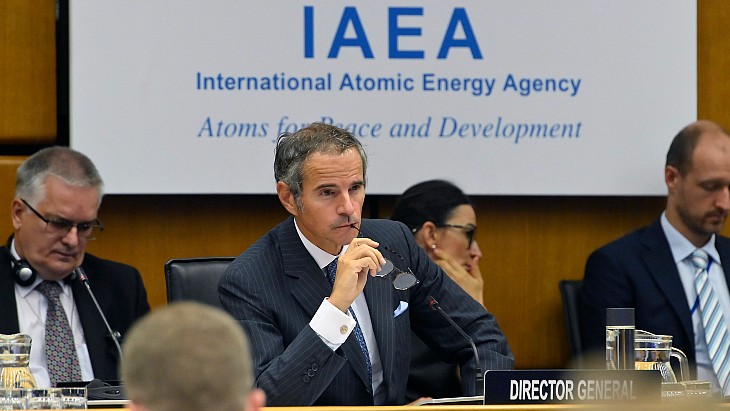
Before getting on to the substance of his statement to the IAEA board - covering issues including the on-going work in Ukraine and Fukushima and the new Atoms4Food initiative - Grossi said he had to start with the urgent finance situation because he found it "contradictory ... that we talk about so many important things when I don't know whether I'm going to be able to open the shop in one month".
He said that 44% of member states were in arrears "including the major donors" and he said what made it even more frustrating was that he had been in touch with the United Nations Secretariat in New York and with other agencies and global institutions and "no one is in a situation like us".
"So we need commitments soon so we can continue doing what we are supposed to be doing," he added at the start of a week-long IAEA board of governors gathering in Vienna, Austria. He thanked the US ambassador for allowing "us to use some money in a creative way, to make it for this month ... I hope that others can do that as well. But the real thing, the fundamental thing, is that we cannot continue to say that we support this agency when we don't pay for its activity. It's as simple as that".
The director general said that the only time there had been a similar situation for the IAEA was nearly 30 years ago, in 1995, which had triggered discussions and proposals and led to a "very complicated situation ... so I really hope that we will be able to avoid any such situation now - as you can imagine, it's very difficult for me to plan ahead when I don't know if I'm going to be able to pay salaries in one month".
"So I count on your support and I count on that when we say that we support the agency we really do," he said.
The board of governors of the IAEA's role includes examining and making recommendations to the General Conference - which takes place later this month - on the IAEA's financial statements, programme and budget.
Governors briefed on IAEA's work
Fukushima Daiichi ALPs water release: Grossi said that the IAEA continues to work to ensure that relevant international safety standards are applied to sampling of the treated water before release and said that it had been monitoring the seawater since the release began on 24 August. The IAEA provides continuous live data on the release of the treated water and Grossi told the board that its monitoring has confirmed levels of tritium in the discharged water and seawater were below Japan's operational limit.
Ukraine: There have been 53 IAEA missions carried out to Ukraine's five nuclear sites over the past year. He highlighted the work of the IAEA experts at Zaporizhzhia nuclear power plant, which has been under Russian military control for a year and a half. Since he established the first permanent team at the plant a year ago, there have been ten rotations of staff. He told the 35-member IAEA board that "it is the increase of military activity" around that plant "that worries us the most". As well as its work to ensure the safety and security of nuclear facilities, the IAEA has also provided technical assistance in the country following the flooding caused by the Kakhovka dam's destruction, he said.
Iran: The director general updated the board on verification and monitoring in Iran, noting the joint statement by the Atomic Energy Organisation of Iran and the IAEA in March: "Of course, our work with our colleagues from the Islamic Republic of Iran continues ... I hope to do better, and our Iranian colleagues know that. So, we will continue working together, trying to go faster and better and deeper in this important and indispensable area."
Atoms4 Food: Grossi said this new initiative is aimed at supporting member states in increasing food production, food safety, agricultural planning and nutrition programming, using nuclear and isotopic techniques. He also referenced progress on the IAEA's Rays of Hope initiative, which has widened access to cancer care in Benin, Chad, Keny, Malawi and Niger as well as Botswana, which opened its first public radiotherapy centre. There had also been progress, he said, with the NUTEC plastics initiative and the Zoonotic Disease Integrated Action initiative, which is aimed at helping avoid pandemics from diseases passing from animals to humans.
Harmonisation: Grossi also highlighted the IAEA's attempts to harmonise regulatory approaches and standardise industry approaches, "which will support the timely deployment of safe and secure small modular reactors". He also said the IAEA was opening its Nuclear Security Training and Development Centre on 3 October, "the first truly international centre of capacity building in the area of nuclear security". On gender equality initiatives, he said the IAEA's Marie Sklodowska Fellowship Programme would soon award scholarships to 200 women engaged in nuclear-related master's programmes. He added that he was on track to get to gender parity at the IAEA by 2025, having now "gone above the 43% line".